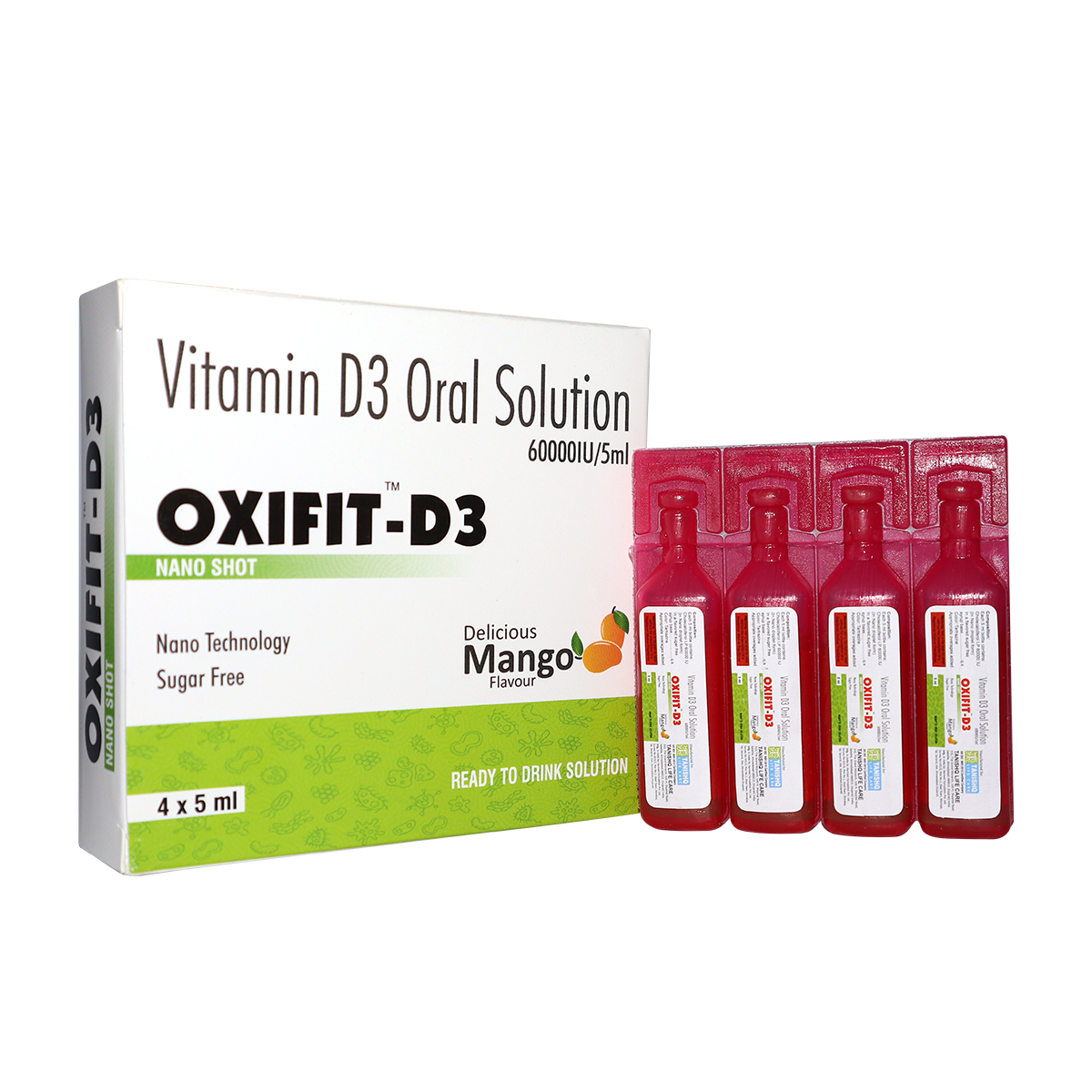
Oxifit-D3 Nano Shot
- Cholecalciferol (Vitamin D3) is the natural, biologically active form of Vitamin D, which is produced by the body when the skin is exposed to sunlight. It is essential for the regulation of calcium and phosphate in the body, promoting healthy bones and teeth.
- Vitamin D3 is also important for immune function, muscle strength, and mood regulation.
- The granules are an easy-to-consume form, often preferred for those who have difficulty swallowing tablets or capsules. The butter scotch flavor enhances the taste, making it more enjoyable, particularly for children or individuals sensitive to the taste of traditional supplements.
- Recommended Usage
Indications:
This high-dose form of Cholecalciferol (60,000 IU) is typically used in the following situations:
- Vitamin D Deficiency:
- This high dose may be prescribed for individuals with a severe Vitamin D deficiency, especially in cases where other forms of Vitamin D have not been effective in increasing blood levels of Vitamin D.
- People at risk for osteoporosis, rickets, or osteomalacia may need higher doses to maintain bone health.
- Bone Health:
- Vitamin D helps the body absorb calcium, which is vital for maintaining healthy bones and teeth. A deficiency in Vitamin D can lead to weakened bones, increasing the risk of fractures.
- It can be used as part of the treatment for osteoporosis and rickets, particularly when lower doses aren’t sufficient.
- Supporting Immune Function:
- Vitamin D is a vital modulator of the immune system and can help reduce the risk of infections and inflammation-related diseases.
- It may be used to support respiratory health and reduce the risk of chronic diseases such as autoimmune conditions, heart disease, and certain cancers.
- Mood Regulation:
- Low levels of Vitamin D have been associated with depression and seasonal affective disorder (SAD). High doses of Vitamin D can be used to address such mood disorders.
Dosage and Administration:
60,000 IU of Cholecalciferol is a high-dose supplement typically taken for a short period of time, often as part of a loading dose regimen to quickly raise Vitamin D levels in individuals who are deficient.
Recommended Dosage:
- For Vitamin D deficiency, the usual recommendation might be 60,000 IU once a week for a specific period (usually 1-2 months).
- After achieving the desired Vitamin D levels, the dosage may be reduced to a maintenance dose (usually 1,000–2,000 IU/day) depending on individual needs and doctor’s advice.
Granule Form:
- The granules can be mixed with water, juice, or a soft food product (like yogurt) for easier consumption.
- It’s typically taken once a week, as the high dose provides enough Vitamin D to meet weekly requirements.
Absorption: Since Vitamin D is fat-soluble, it is best taken with a meal containing some fat to enhance absorption, although it can still be taken without food.
Precautions:
- Overdose:
- While Vitamin D toxicity is rare, it can occur when excessively high doses are taken over prolonged periods, leading to hypercalcemia (elevated calcium levels in the blood), which can result in symptoms like nausea, vomiting, fatigue, kidney stones, and heart issues.
- The upper tolerable intake for Vitamin D is generally 4,000 IU/day for adults, so it's essential to avoid taking other Vitamin D supplements while using this high-dose product unless advised by a healthcare provider.
- Kidney Function: Individuals with kidney problems or a history of kidney stones should use this product cautiously, as high doses of Vitamin D can lead to an excess of calcium in the bloodstream.
- Pregnancy and Breastfeeding: Although Vitamin D is generally safe during pregnancy and breastfeeding, it is important to consult a healthcare provider for proper dosing to avoid excessive intake.
- Interactions:
- Certain medications, such as steroids, anti-seizure drugs, and weight loss medications, can interfere with Vitamin D metabolism, so it’s important to inform your healthcare provider if you are on any of these medications.
- Vitamin D can also interact with other calcium and magnesium supplements, so it’s important to monitor your intake of these minerals.
Product Category
- Anti Infective
- Injectables
- Pre Filled Syringe
- Immunosuppressants
- Anti Ulcerant/ppis
- Joint Care
- Enzymes
- Heamatinic Agents
- Antioxidant Multivitamins
- Laxatives
- Anti Alergic
- Corticosteroids & Combinations
- Anti Fungal
- Medicated Soaps
- Emollients and Moisturisers
- Face Care
- Puva & Sun Protectors
- Hair Care
- Anti Acne Preparation
- Analgesics Antipyretics & Anti Inflammatory
- Anti Spasmodic & Anti Emetic
- Expectorants Antitussives & Mucolytics
- Antidiarrheals
- Cardiac Drugs
- Antipsychotics
- Anti Epileptics
- Migraine
- Anti Dyspetic
